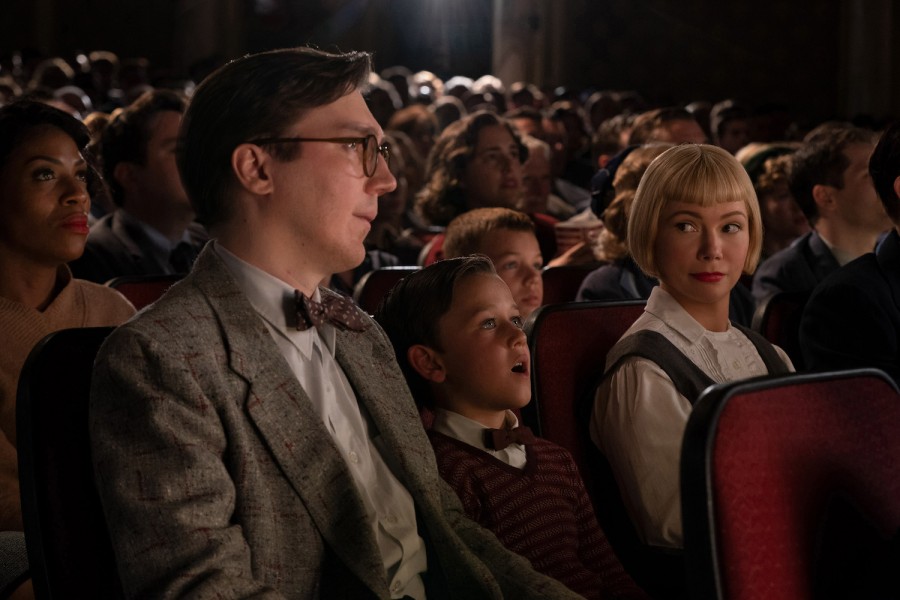Review: ‘The Fabelmans’ is Spielberg at his most vulnerable
In a career notable for poignant moments, legendary filmmaker Steven Spielberg gets more personal than ever in this Oscar-nominated, semi-autobiographical tale.
Merie Weismiller Wallace/Universal Pictures and Amblin Entertainment
(from left) Burt Fabelman (Paul Dano), Younger Sammy Fabelman (Mateo Zoryan Francis-DeFord) and Mitzi Fabelman (Michelle Williams) in The Fabelmans, co-written, produced and directed by Steven Spielberg. (Courtesy of Storyteller Distribution Co., LLC)
March 8, 2023
In a career spanning over half a century, Steven Spielberg has tackled a wide array of subjects in his movies: dinosaurs, archaeologists, aliens, combat soldiers, sharks, rebelling slaves and more. One subject he had yet to tackle, however, was his childhood self.
In his latest film, “The Fabelmans,” Spielberg finally “phones home” and reflects on his upbringing in America post-World War II. Co-written by Spielberg and his frequent collaborator, Pulitzer Prize-winning playwright Tony Kushner, “The Fabelmans” is an exciting tale about a young artist discovering and nurturing his craft.
In 1952, a young boy named Sammy Fabelman (Mateo Zoryon Francis-DeFord) reluctantly goes with his mother Mitzi (Michelle Williams) and father, Burt (Paul Dano), to see his first movie. Upon witnessing the climatic train crash scene from Cecile DeMille’s “The Greatest Show on Earth,” Sammy becomes horrified, and Mitzi and Burt fear they’ve traumatized their son. However, Sammy tells his parents he wants a toy train set for Hanukkah and upon receiving it, recreates the scene from memory.
Noticing her son’s latent love of movies, Mitzi allows Sammy to use his father’s 8mm camera to film the train wreck and view it on repeat. This early scene sets the stage for Sammy’s burgeoning passion for filmmaking throughout “The Fabelmans,” mediated by sensations of horror, awe and rapture developing alongside his parents’ growing animosity toward one another.
The Fabelmans move from New Jersey to Arizona for Burt’s job as a computer engineer, taking along with them Burt’s best friend and business partner, Bennie Loewy (Seth Rogen). In his teenage years, Sammy (Gabriel LaBelle) carries a camera everywhere he goes. He films candid shots of his family on camping trips, and uses his Boy Scouts troop as cast and crew for small film projects that he dreams up. Several of his movies are screened for his fellow troop members and their families.
Up until this point, the film fulfills the requirements of your typical coming-of-age tale, but Spielberg’s ingenuity begins to show as Sammy’s fixation with film leads him down an emotional path. Pairing fascination with ruination, Spielberg builds a heartfelt tale about morality, wrought with insightful yet hard-to-swallow truths.
While providing entertainment for small audiences within his social circle, Sammy also finds much of his free time occupied with watching the footage he has shot. In doing so, he notices details of his family he had previously ignored and begins to re-examine his relationship to each member. Sammy is most taken aback by the stark contrast between his parents. Burt is practical and unexciting, while Mitzi is free-spirited, playful and a passionate pianist — a reflection of Speilberg’s own mother, who referred to herself as Peter Pan.
Family arguments occur over dinner, on road trips and behind closed doors. Although these painful moments speak to Spielberg’s personal experience growing up while his parents grew apart, they represent his generation’s communal fear about their idyllic American lifestyle crumbling apart. Beyond the family unit, Sammy also experiences trouble growing up Jewish in post-war America. He is the target of frequent antisemitic attacks after his family’s move to northern California, such as when his last name is parodied as “Bagelman.” Despite the challenges he faces, one thing is always certain for Sammy: the comfort he feels when holding a camera.
“The Fabelmans” stands out for its willingness to acknowledge the complex emotions involved when looking back on one’s childhood. Spielberg becomes more vulnerable than ever before as he and Kushner showcase, rather than ignore, the painful parts of his own childhood. Spielberg puts enough on the table to create a full narrative arc while not bombarding the audience with too many details. The lightness one would expect from a coming-of-age film is there, but it is paired with the deep emotional punch for which the director is known.
“The Fabelmans” is special for showcasing the passion and emotion that comes with filmmaking. Sammy makes movies because he loves the art form, not with the intention of making money or becoming famous. While his real-life counterpart did achieve success in Hollywood — Spielberg is indeed the highest-grossing film director of all time — Sammy’s artistic integrity stays intact throughout.
Nostalgic, vulnerable and entertaining, “The Fabelmans” is Spielberg doing what he does best: creating entertaining stories that all can relate to. In a career filled with moving projects, “The Fabelmans” is Spielberg’s most honest work, and one of his most emotional.
Contact Madeline Kane at [email protected].
























































































































































